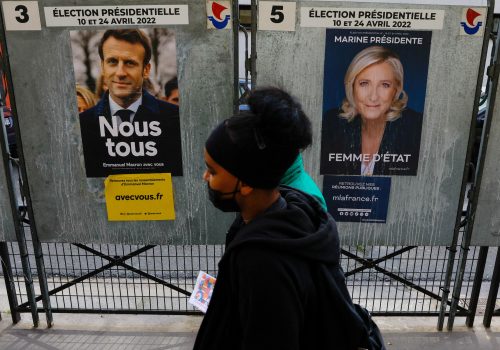Experts react: Macron wins another presidential term. What now for France, the EU, and the world?
France gave him five more years. Centrist President Emmanuel Macron won re-election Sunday, topping far-right challenger Marine Le Pen in a battle that had major implications for NATO, the European Union (EU), populism, and more. Macron’s decisive victory was also historic: He’s the first French president with a parliamentary majority to be re-elected since the Fifth Republic was born in 1958. We reached out to our experts at the Europe Center for more on what the results tell us, and what to expect from Macron in his second term.
Jump to an expert reaction
Gérard Araud: Macron rallies ‘the beavers,’ but French politics are still muddy
Marie Jourdain: Europe was not voting, but Europe was at stake
Rama Yade: A fragile ‘front’ against the far right holds—for now
Dave Keating: ‘A deep sigh of relief’ in Brussels
Macron rallies ‘the beavers,’ but French politics are still muddy
In most capitals a sigh of relief greeted the clear victory of Emmanuel Macron in the second round of the French presidential election. The figures, roughly 58 percent to 42 percent, look uncontestable and impressive.
The French political situation is actually much more ambiguous than these figures indicate on a first reading. The results of the first round—28 percent for Macron—are a more realistic indication of the popular support of the incumbent. In the second round he has benefited from the rallying of what the French call “the beavers” (who want to build a dam) against the far-right without really supporting him.
To summarize an election more complex than it appears, the majority of the 42 percent who chose Marine Le Pen were not far-rightist but were expressing their anger and resentment against a political and social system they consider twisted at their expense. The 58 percent who voted for Macron were often less supporting him than opposing a candidate who remains unacceptable because of her father—an unreconstructed far-rightist—and of her lack of any executive experience.
In other words, Macron doesn’t have the mandate that the figures seem to promise. Furthermore, he will need to get a majority in the coming parliamentary elections in June. French voters typically give a majority to the president they have elected; it might be different this time. The French political landscape is a field of ruins: The traditional center-left and center-right parties have collapsed during these elections, and Macron’s centrist La République En Marche, which held the majority in the outgoing House, has not succeeded in establishing roots in the country and has lost all local elections since 2017. Therefore, the left and the right are trying to unite to prevent the president from getting a majority.
It means that French political uncertainties are not over. The worst scenario—a Donald Trump/Brexit moment—has been avoided, but it remains to be seen whether Macron will be able to govern by himself or will have to create a coalition with another party on the left or on the right.
—Gérard Araud is a distinguished fellow at the Atlantic Council and a former French ambassador to the United States.
Europe was not voting, but Europe was at stake
At the Champ de Mars today, where the partisans of Emmanuel Macron were gathered to celebrate his victory, there were as many French flags as EU ones. The reelected president made clear during his campaign that the European project was at stake, although it remains unclear what part the European issue played for voters. In 2017, Europe as an issue played a decisive role, as leaving the Eurozone was part of Marine Le Pen’s program, and the majority of citizens were not in favor of such a plan. That pledge was not reiterated this time, although her program in 2022 would have challenged the EU with an alternative vision for the bloc.
As war returned to the European continent and with the result of the election much more uncertain this time, the stakes led European leaders to express their concern: The opinion piece by the German, Spanish, and Portuguese leaders published in Le Monde on Friday was unprecedented. Stating “the choice French people are facing is crucial for France and for all of us in Europe,” they laid out how the trajectory of France is intertwined with their own countries, as all of them are EU (and NATO) members. Given that France is a permanent member of the United Nations Security Council, and a founding member of NATO and the EU, none of its partners is indifferent to the result of the election.
While the war in Ukraine is still raging, and France still holds the presidency of the Council of the EU for two more months, the reelected president has a challenge to find the balance between the demanding international/European agenda and the more domestic concerns expressed by French citizens, knowing that 28 percent of them decided not to vote (a record since 1969).
—Marie Jourdain is a visiting fellow at the Atlantic Council’s Europe Center and previously worked for the French Ministry of Defense’s Directorate General for International Relations and Strategy.
A fragile ‘front’ against the far right holds—for now
Emmanuel Macron has won a second term. But it’s worth remembering five takeaways:
- Factoring in those who abstained, 62 percent of voters did not vote for him
- He was re-elected with 38 percent of registered voters, against 43.6 percent five years ago.
- This represents the lowest level of support for a winning president since Georges Pompidou in 1969.
- Abstention was near record levels.
- Exceeding 40 percent for the first time, the nationalists made progress, marking the failure of a president who intended to reduce the influence of the far right in the country.
Once again, the “republican front”—a coalition opposed to the far right—saved Macron, like all presidents elected against the nationalists, but this front is increasingly fragile: The number of supporters of far-left candidate Jean-Luc Mélenchon in the first round who went on to vote for Macron declined by 10 percentage points from 2017, to 42 percent, while Le Pen’s share rose by the same amount, to 17 percent. (The rest sat out or left their ballots blank.)
Even more than in 2017, this election leaves a country divided electorally (this time no longer in two but in three parts) as well as sociologically (with a president supported by retired people, senior executives, and conservatives who want nothing to change). And more importantly, the country is frustrated and angry.
Macron can cope with it just like last time and say only the victory matters. Or he can finally rise to the level that history demands. Because, more than ever, the country cannot afford to lose five years.
—Rama Yade is director of the Africa Center, senior fellow at the Europe Center, and former French deputy minister for foreign affairs and human rights.
‘A deep sigh of relief’ in Brussels
Brussels greeted the news of Macron’s reelection, by a wide margin, with a deep sigh of relief. Commission President Ursula von der Leyen sent out a note of congratulations almost immediately. But there is still great unease that, twice in five years now, the EU had to worry about its second-largest country falling to the far right.
Now people in Brussels are looking ahead to the legislative elections in a few weeks time. The prospect of a divided cohabitation government, where the French president doesn’t have a majority in parliament and the prime minister comes from a different party, would not be welcomed here. It would mean that the ministers in the Council of the EU, the upper house of the EU’s legislature, could take decisions in opposition to France’s representative in the European Council, Macron.
However, even if Macron is unable to get a majority in parliament, the majority that is formed would likely be made up of the center-left and center-right—and thus unlikely to be in extreme opposition to Macron’s EU policies. But tonight Jean-Luc Mélenchon, the far-left leader who came in third just barely behind Marine Le Pen in the election’s first round, called on voters to make him the next prime minister of France. Le Pen made the same appeal. While a far-left or far-right majority in parliament remains a very distant prospect, were it to come to pass it could lead to gridlock in the EU’s lawmaking process.
—Dave Keating is a nonresident senior fellow at the Europe Center and the Brussels correspondent for France 24.
Further reading
Sun, Apr 24, 2022
With Macron’s victory, the ‘fragile’ center holds in France
Fast Thinking By
Our experts break down Sunday’s presidential election triumph for French President Emmanuel Macron and what it means for Europe.
Fri, Apr 8, 2022
French Election Dashboard: Everything you need to know about the presidential race
Trackers and Data Visualizations By
France will hold the first round of the 2022 Presidental Elections on Sunday, April 10, 2022. If no single candidate wins a majority after the first round, the two candidates who secured the most votes will participate in a runoff on Sunday, April 24, 2022.
Thu, Apr 7, 2022
How will Russia’s war in Ukraine reshape the European political scene? Look to France.
New Atlanticist By Marie Jourdain
France's presidential elections this month represent an important barometer of the strength of European populism. Here's how the war has already shaken the campaign.
Image: French President Emmanuel Macron waves as he arrives to deliver a speech after being re-elected as president, following the results in the second round of the 2022 French presidential election, during his victory rally at the Champs de Mars in Paris, France, April 24, 2022. REUTERS/Benoit Tessier


